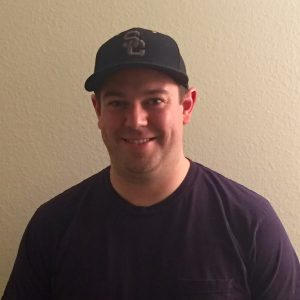Why did you choose to become a preceptor? What do you enjoy about it?

From an early age in life, I understood how important mentorship and encouragement is in education. My mom made her career in education and my wife, Gloria (USC Rossier School of Education grad), is also a teacher. I’ve always had the utmost respect for those that give back to society through teaching. This background has shaped me in life and early in my career as a pharmacist.
Throughout my years at USC Mann, I was fortunate to work with many preceptors who inspired and motivated me to prepare myself for my future career, which inevitably, involves life-long learning. The thing I love most about precepting is seeing the students I’ve precepted enter challenging and successful pharmacy career paths and then come back to share old stories about things we worked on together that helped them attain their goals. One thing that never gets old is watching a student in their P1 year, who has minimal practical pharmacy knowledge, develop into a pharmacist prepared for the workforce, residency, fellowship, or whatever their post-graduation goals may be.
How has USC Mann helped you in your career today? Why do you think prospective students consider the school?
USC Mann helped me understand very early on how dynamic a PharmD can be. Shortly after my first year, my passion was in the world of clinical pharmacy and I navigated pharmacy school with the mindset that I needed to do what was necessary to prepare myself for a strong residency program. However, many of my classmates were preparing themselves for many other career paths. Those included community pharmacy, pharmaceutical industry, specialized clinical pharmacist positions, just to name a few.
Working in and out of the classroom with such a diverse group of individuals with an array of different goals helped me think about things in ways I wouldn’t have otherwise. It also was comforting to realize that if for some reason, what I thought I liked early on in pharmacy school didn’t turn out the way I anticipated, there were many other options for me after graduation. USC Mann understands the many different paths one may navigate after graduating and provides opportunities to learn and connect with experts in all of these different fields. Prospective students really need to understand that what the general public thinks pharmacists do is only the tip of the iceberg of what pharmacists are actually out there doing on a daily basis.
USC has a tight-knit alumni network. How did this network benefit you during your time at USC/after your time at USC? What resources available at USC did you find particularly helpful?
Most people hear, “Remember, pharmacy is a small world,” about 5,000 times before graduation. Even though you will now have been told the truth 5,001 times before graduating, remember USC Mann alumni network is an even smaller world.
I can’t speak highly enough about the accomplishments of our alumni and their willingness to provide the support system I so heavily relied on to keep pushing myself through pharmacy school. During my time at USC, I was provided with my first intern pharmacist position by alumnus, Dr. Mike Nakamura. To this day, Dr. Nakamura remains a mentor and great friend to me. After residency, he provided me with my first opportunity as a clinical pharmacist. Now, Dr. Nakamura is now the director of a neighboring hospital, but he left a legacy of USC intern pharmacists at the hospital I now work for. I now have the pleasure of helping carry on that legacy by overseeing and mentoring our group of 11 USC interns. The most valuable resources I have found at USC are the people, and you will never find a more valuable resource.
How does the school prepare students for future jobs in the industry?
The PharmD is such a dynamic degree that allows students opportunities to pursue a plethora of pharmacy careers. Besides providing the foundation of knowledge necessary to earn a Doctor of Pharmacy degree, USC Mann does an excellent job of allowing students to become involved in student organizations and provides numerous networking opportunities with professionals that are involved in all of these different career paths. In addition, the network and caliber of rotation sites the school maintains is second to none.
What advice do you have for current Pharmacy students?
Get exposed to all that your degree can offer. Keep an open mind through school and once you find the pharmacy arena you have the most passion for, prepare yourself before graduation to enter a career in that particular pharmacy field. Seek out mentors and preceptors who currently work in that field of pharmacy and find out everything you can from them before you graduate. Network and establish a group of working professionals and classmates who can provide support not only through school, but throughout your career.
Why should other pharmacists consider being a preceptor for the school?
There are students who will never find their way into a career path similar to yours without the right mentor. In my opinion, too many pharmacists today are asking the schools, “What can your students do for me?” Instead, we should understand that quality teaching, mentoring, and precepting will produce more quality, innovative future pharmacists. These are the types of pharmacists that will help advance our profession and create even more opportunities for all pharmacists in the future.
Is there anything else you’d like to share about your career or involvement with the greater Trojan Pharmacy community?
I just want to thank Dr. Ron Alkana, for everything he taught me about leadership, team building, and compassion for others. Each needs the help of the other. You are truly missed.

